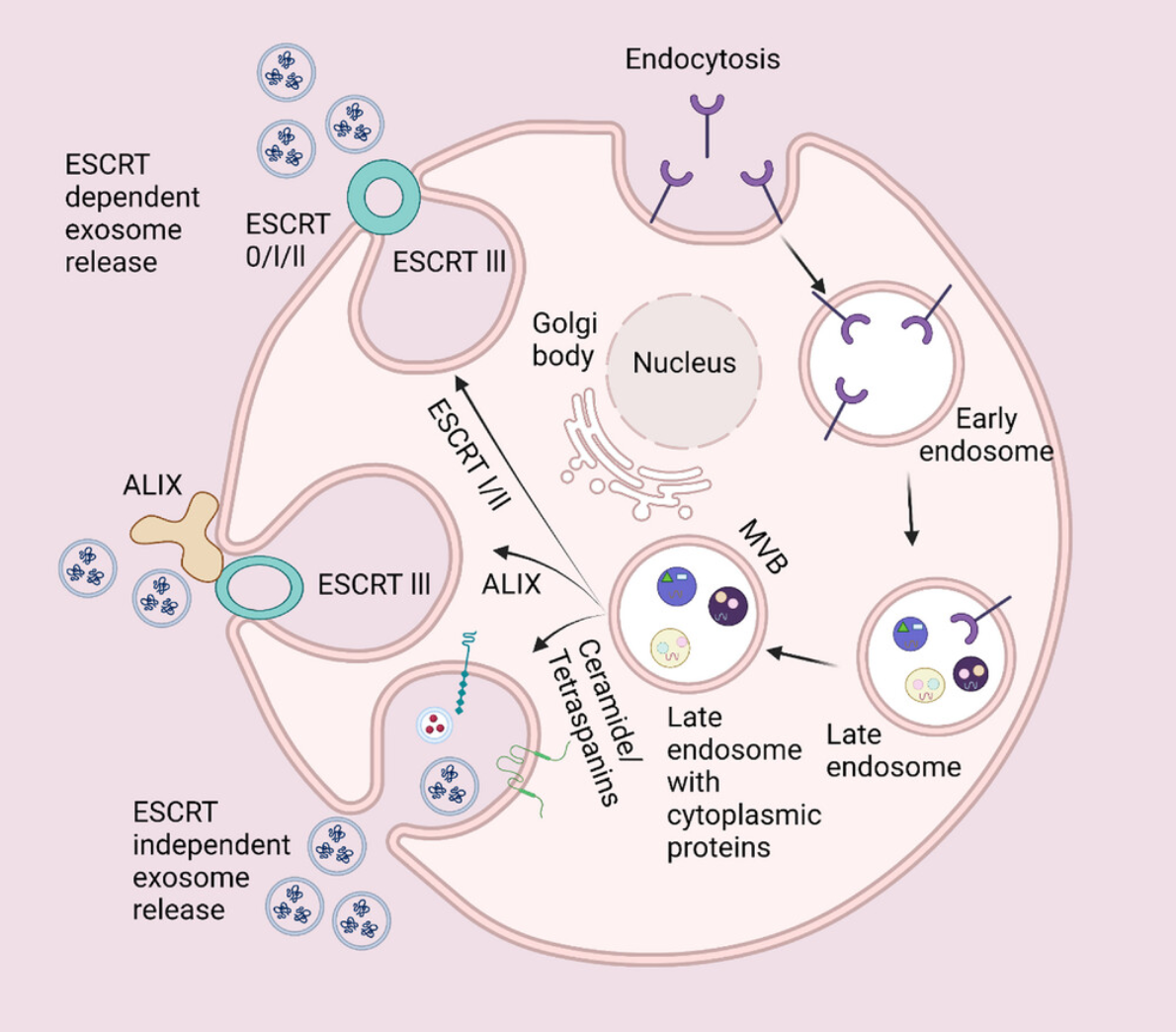Exosomal Biogenesis and Identification Service
- Isolated Exosomes: ≥200 μg total protein or ≥100 μL in PBS
- Plasma/Serum: ≥2 mL per sample
- Cell Culture Supernatants: ≥5 mL per sample
- Other Body Fluids: Please inquire for specific requirements
Exosomes are nano-sized extracellular vesicles that originate from the endosomal pathway and play pivotal roles in intercellular communication, cargo transport, and cellular homeostasis. Secreted by nearly all cell types, exosomes carry diverse biomolecules—including proteins, lipids, RNAs, and metabolites—reflecting the physiological and pathological states of their cells of origin. Their cargo and biological functions are shaped during a tightly regulated biogenesis process, making the study of exosomal biogenesis essential for interpreting their biological relevance and therapeutic potential.
Exosomal biogenesis involves the invagination of the endosomal membrane to form intraluminal vesicles (ILVs) within multivesicular bodies (MVBs), followed by MVB fusion with the plasma membrane to release exosomes. This process is orchestrated by mechanisms including the ESCRT complex (endosomal sorting complex required for transport), lipids, tetraspanins (e.g., CD63, CD81), and Rab GTPases (e.g., Rab27a/b). Aberrations in these pathways have been linked to various diseases, including cancer, neurodegeneration, and immune disorders.

Figure 1. Mechanism of Exosome Biogenesis and Release
To fully exploit the diagnostic and therapeutic potential of exosomes, accurate identification and detailed understanding of their biogenesis is critical. MtoZ Biolabs offers a comprehensive Exosomal Biogenesis and Identification Service to support researchers in deciphering exosome formation mechanisms and validating exosome presence and purity with confidence.
Service at MtoZ Biolabs
MtoZ Biolabs provides an integrated service portfolio covering both the investigation of exosomal biogenesis pathways and the precise identification of exosomes from various biological sources.
Our Exosomal Biogenesis and Identification Services include:
💠Molecular Analysis of Biogenesis Pathways: Profiling expression and activity of key biogenesis regulators.
💠Multi-Omics Analysis: Proteomics, transcriptomics, and lipidomics to reveal pathway activation, cargo loading signals, and cellular responses.
💠Exosome Identification and Characterization: Using transmission electron microscopy (TEM), nanoparticle tracking analysis (NTA), Western blotting, and flow cytometry to confirm exosome presence, size, and marker expression.
💠Subcellular Localization and Trafficking Studies: Immunofluorescence and confocal microscopy to monitor vesicle trafficking and endosomal dynamics.
💠Functional Assays: Evaluation of exosome secretion rates, intercellular uptake, and biological activity in vitro and in vivo.
Service Advantages
✅ Advanced Analysis Platform: MtoZ Biolabs established an advanced exosomal identification platform, guaranteeing reliable, fast, and highly accurate analysis service.
✅ Customizable Solutions: Fully tailored workflows to fit your research model, cell type, or analytical goal.
✅ Multi-Omics Expertise: Deep experience in proteomics, lipidomics, transcriptomics, and bioinformatics.
✅ Expert Team Support: Consultation from experimental design to data interpretation.
✅ Fast Turnaround: Efficient project delivery without compromising data quality.
Applications
1. Mechanistic studies of exosome formation
Elucidate the molecular pathways and regulatory factors involved in exosomal biogenesis.
2. Disease mechanism research
Investigate how exosome biogenesis and secretion contribute to disease progression, including cancer metastasis and neurodegenerative disorders.
3. Drug delivery development
Evaluate the impact of biogenesis mechanisms on the yield and quality of engineered exosomes for therapeutic use.
4. Biomarker discovery
Identify disease-specific changes in exosome production or molecular composition across different conditions for diagnostic and prognostic purposes.
Sample Submission Suggestions
We accept the following sample types:
Samples should be stored at -80°C and shipped on dry ice. Avoid repeated freeze–thaw cycles. Please consult us for tailored collection and storage protocols to maximize data quality.
Deliverables
1. Comprehensive experimental details
2. Identification results of exosomal biogenesis-associated markers
3. Exosome characterization data including size distribution and morphology
4. Optional multi-omics profiles (proteins, lipids, RNAs)
5. Customized analysis report
MtoZ Biolabs' Exosomal Biogenesis and Identification Service provides a robust and integrative platform to explore these processes across cell types, conditions, and applications. Contact us today to discuss your project and request a customized proposal!
Related Services
Exosome Isolation and Purification Service
How to order?







